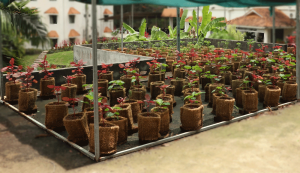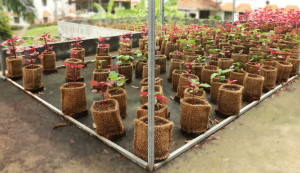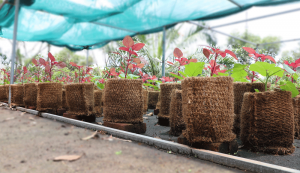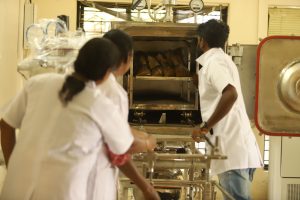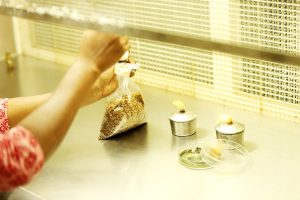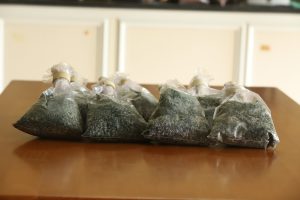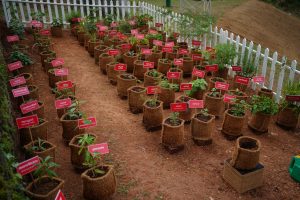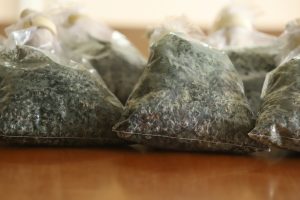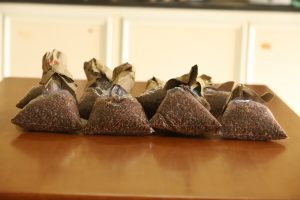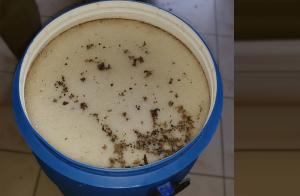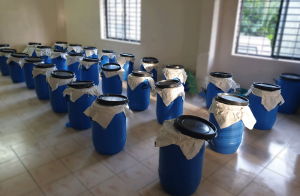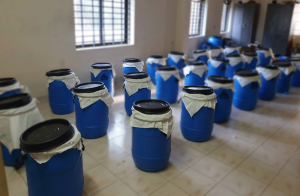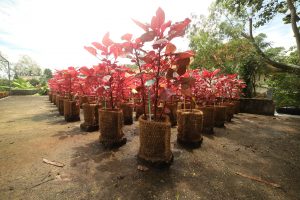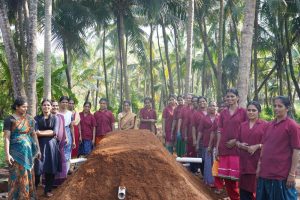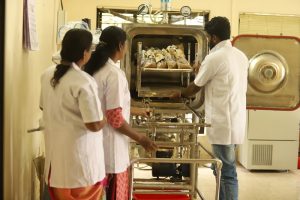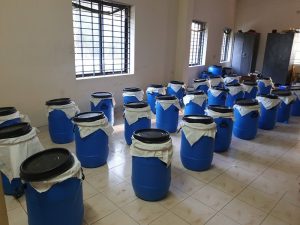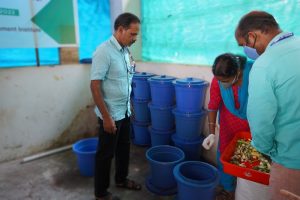About the Division
The Microbiology Department at NCRMI is at the forefront of groundbreaking research aimed at cultivating easily accessible, cost-effective, and environmentally sound technologies within the coir industry, employing the potential of biological interventions. This innovative approach has resulted in a series of significant milestones, leading to the development and enhancement of a diverse range of pioneering products. Notable among these are Trichopith, a catalyst for optimizing coir pith composting, Pith activator, a catalyst for the efficient processing of household organic waste, Peatkol dots, a sustainable alternative to charcoal, E coirbag, a sustainable substitute for synthetic grow bags, Tricho pith plus, an advanced coir pith compost infused with trichoderma, Coconurture, a highly effective potting medium derived from tender coconut, and Nutripith, nutrient-rich pellets designed to enhance plant growth. With an unwavering dedication to cutting-edge microbiological research, the Microbiology Department at NCRMI remains committed to driving sustainable progress in the coir industry.
Coconurture
NCRMI formulated a Minimum Soil Organic Potting Filler, a blend of crushed tender coconut husk, coir pith, farmyard manure, and a specialized Trichoderma variant. Engineered to optimize plant growth, this organic composition enriches the soil with essential nutrients and moisture-retention properties, fostering a fertile environment for robust plant development. Notably, the incorporation of the Trichoderma variant acts as a natural defense mechanism, effectively preventing soilborne diseases and fortifying the plant's root system. With its unique amalgamation of organic elements and disease-preventative properties, NCRMI's Potting Filler promises to revolutionize sustainable agriculture, ensuring healthier and more resilient plant cultivation practices.
Trichopith Pro
NCRMI introduces Trichopith Plus, an innovative coir pith composition embedded with a specially formulated Trichoderma strain. This cutting-edge blend enhances disease resistance and promotes robust root development, fostering a sustainable and productive agricultural ecosystem. Trichopith Plus accelerates crop yield, bolsters soil fertility, and exemplifies NCRMI's commitment to efficient and sustainable farming practices. With its seamless integration and unparalleled efficiency, Trichopith Plus stands as a testament to NCRMI's dedication to pioneering agricultural advancements, providing farmers with a reliable solution for enhanced crop cultivation and resilient agricultural systems.
Peatkol Dots
Developed Peatkol Dots, a cutting-edge innovation in lightweight black carbon bio briquettes, is derived from carefully heated, sterilized coir pith, where controlled air access is limited to eliminate moisture and unstable components. Notably, the high burning temperature of Peatkol Dots can be attributed to the presence of lignin within the coirpith, a key element that fortifies the resulting charcoal disc upon carbonization. Retaining the characteristic smoky flavor reminiscent of traditional slow-burning charcoal, Peatkol Dots offer a viable alternative to conventional incense methods. Non-toxic and devoid of any discernible odor, this versatile product can be utilized in various settings. For those seeking aromatic experiences, Peatkol combined with selected additives proves to be an ideal solution for fragrance and dhoop purposes.
Ecoirbag
An eco-friendly grow bag named as Ecoirbag is made from treated natural coir mattings. The coir bags are perfect for garden with limited space and ideal for growing vegetable, fruits, flowers, herbs, indoor plants etc. It is reusable and durable. It prevents root circling and stunted growth of plants. It provides superior insulation in winter and summer conditions. Unlike plastic, the fabric allows air to reach plant roots so the soil won’t get soggy.
Trichopith
NCRMI has successfully formulated a bio inoculum designed to accelerate and streamline the composting process of coir pith. This innovative solution yields a stable and mature compost, optimizing the ideal C:N (carbon to nitrogen) ratio crucial for fostering soil microorganisms. Consequently, it stimulates heightened microbial activity within the soil, effectively revitalizing and rejuvenating the soil quality. In contrast, incomplete composting can trigger nitrogen immobilization, leading to stunted plant growth, as well as the characteristic yellowing and wilting of crops. Notably, this specially formulated bio inoculum also serves as a bio control agent, offering protection against various soil-borne diseases, while simultaneously creating an ideal organic growth medium conducive to sustainable and thriving crop cultivation.
Pith Activator
At the forefront of biodegradation enhancement, NCRMI developed Pith Activator, a potent effective microorganism (EM) designed to expedite the breakdown process of household organic waste. This innovation incorporates coir pith as a vital bulking agent, known as the coir pith inoculum, maintaining a thriving microbial population within the activator during composting. Leveraging its superior water absorption capacity, neutral pH, and notably high C/N ratio, coir pith plays a pivotal role in facilitating the accelerated biodegradation facilitated by the Pith Activator. The inclusion of common and food-grade aerobic as well as anaerobic microorganisms within the Effective Micro-organisms (EM) further amplifies the efficiency of organic conversion.
Potting Filler Using Coirpith Compost
A novel Potting Filler, harnessing the benefits of Coir pith compost, was meticulously formulated. This unique blend integrated Coir pith compost, Trichopith and farmyard manure, minimizing the requirement for soil. Subsequent field evaluations were conducted on various crops, utilizing this optimized potting mixture.
Utilization of coir pith for the production of bio plastic using significant microbial Strains.
Bioplastics, derived from polyhydroxyalkanoate (PHA), mimic the physio-chemical properties of petrochemical plastics and are produced by certain microorganisms using coir pith as a carbon source. Gram-positive Bacillus species isolated from coir pith demonstrated potential for PHA production, with ongoing efforts for genotypic characterization and optimization of production processes.
Conversion of household organic waste into compost using coir pith enriched with different beneficial microorganisms.
The study emphasizes the use of coir pith enriched with effective microorganisms (EM), such as the developed 'Pith Activator,' to expedite home composting of organic waste. Ongoing research involves the optimization of microbial consortia, analysis of compost quality with diverse waste types, and the evaluation of composting bins for effective stabilization of food waste.
Optimizations of pith activator for the composting of household organic waste using passive aeration bin
Bin composting, particularly the three-bin system, is a suitable treatment option due to its ability to retain heat and moisture, allowing for staged composting. However, optimizing operating conditions, including factors like moisture, C/N ratio, and temperature, is crucial for achieving significant and stabilized compost. Ongoing research involves a comparative study using plastic and earthenware bins, along with the exploration of additives like lime, coir pith, and Pith Activator to accelerate the composting process.
Development of technology for conversion of tender coconut husk into organic manure
The project aims to convert tender coconut husks into value-added products like compost by employing composting procedures with cellulolytic and lignolytic microorganisms. Ongoing studies involve the development of effective strains for cellulose-rich material degradation, and the field evaluation of raw crushed tender coconut as organic manure for diverse crops and plants.
Field evaluation of differently treated coir pith compost developed by NCRMI
A potting mixture ideal for plant cultivation was formulated by incorporating crushed tender coconut product and composted coir pith while minimizing the use of traditional soil. Field evaluation studies were then conducted, assessing the efficacy of this potting mixture across various crops. The results aim to establish a sustainable and effective alternative to conventional soil-based potting mixtures, promoting the utilization of tender coconut by-products for enhanced plant growth and development.
Collaborative project on identifying coir pith based nutrient rich growing media suitable for vegetable cultivation in terraces between Kerala Agricultural University and NCRMI
Field experiments, detailed in the interim report by KAU, utilized a lightweight, nutrient-rich growing medium for terrace cultivation, replacing sand and soil with coir pith and rice husk. Six crops were tested, and ongoing efforts involve data analysis and statistical interpretation of the recorded observations on growth, yield, and physiological aspects, along with a comprehensive analysis of the physical, chemical, and biological properties of various potting mixtures.
Collaborative project for the fortification and enrichment of coir pith compost and its evaluation
In collaboration with CWRDM, NCRMI has standardized the production of fortified coir pith compost (F-CPC) using Trichoderma, aiming to enhance nutrient content for container cultivation and soil-less mediums. Ongoing efforts include the characterization of moisture retention properties and nutrient release characteristics, with upcoming pot culture experiments using F&E-CPC and other products for selected vegetables.
Development of biofilm on coir-based biomass carriers for treating effluent water
The project focuses on sustainable wastewater recycling using microbial biofilms on coir-based products as a substrate, avoiding the environmental drawbacks associated with chemical processes. NCRMI has successfully addressed challenges in choosing and preparing a standard laboratory effluent for controlled experiments, leading to a satisfactory match with public sewage effluent. The development of a portable and economically viable mini-scale treatment plant, coupled with a refined coir-based biomass carrier for biofilm development, has demonstrated effective wastewater treatment, supported by routine microbiological and chemical analyses, showcasing the potential of coir biomass carriers in wastewater treatment.
Development of bacterial consortia to treat ret liquor
The study aims to address the environmental impact of mechanical coir fiber extraction by developing a treatment system to remove pollutants from ret liquor and recycle the water for subsequent washes.
Treatment of coir fibre with various biological and chemical agents to improve the texture and colour
This study focuses on a combined chemical and biological treatment to produce higher quality coir fibers with significantly reduced retting time, making it more environmentally friendly. The developed process shortens the retting time from 6 months to 24 hours, requiring less water and providing better physical and mechanical properties for chemically treated coconut fibers compared to conventionally retted fibers.
Identification and characterization of microorganisms including bacteria & fungi in automated systems- and supply of mother culture on behalf of Department of Agriculture, Kerala
NCRMI is distributing the fungus Trichoderma harzianum mother culture to biocontrol production units via Krishibhavans and is also offering quality testing services for samples submitted by the Department of Agriculture.
Standardization and formulation of bacterial consortia for the biosoftening of coir fiber
This study aims to bio-soften coir fibers using bacterial consortia isolated from coir retting areas as an economical alternative to chemical treatment
Biodegradation studies of coir geotextiles under varying condition - laterite soil and sandy soil
This study investigates the biodegradation of coir geotextiles of different soil types.
Isolation and characterization of microflora to hasten the retting process
A detailed investigation across different locations in Kerala identified location-specific microorganisms associated with the retting process, and phenotypic characterization using MALDI-tof technology was performed to screen selected microorganisms for enzyme/metabolite production in consortium preparation.
Phenotypic and genotypic characterization of bacteria and fungi using automated instruments
Microbes from coir retting sites, including Chromobacterium violaceum, Bacillus sp, and others, were identified using MS Vitek MALDI-TOF, revealing lignin-decomposing and phenol-degrading bacteria, such as Chromobacterium violaceum, with potential biodegradation applications.
Biochemical profiling and optimization of cultural conditions of selected microorganisms for softening and brightening of coir fiber
Profiling the chemical/biochemical reactions during bio softening and bleaching of coir fiber using microbial consortia enables a comprehensive understanding of the process, facilitating the exploitation of microorganisms to enhance fiber quality with minimal environmental impact. Through qualitative screening, two strains (SWGM and MFGP) with significant lignin-degrading activity were identified among 13 isolates, demonstrating potential for large-scale production to benefit the coir industry.
Studies on various biological & chemical treatments to enhance the speed and efficiency of coir pith composting
Coir pith, initially unsuitable due to its wide carbon-to-nitrogen ratio and high lignin content, becomes a valuable resource after 30 days of composting with Trichoderma harzianum and poultry manure, demonstrating improved electrical conductivity, pH, C:N ratio, and NPK values compared to conventional methods, as confirmed by successful field trials. Study on the effect of differently treated coir pith on various crops
The Microbiology Lab at the National Coir Research and Management Institute (NCRMI) is a leading research facility along with its state-of-the-art infrastructure and advanced microbiological instruments.
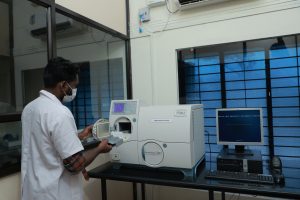 VITEK-2 COMPACT
VITEK-2 COMPACT
Microbial identification system that can quickly and accurately identify bacteria and fungi.
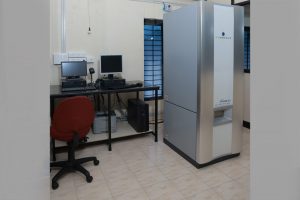 MALDI -TOF–Vitek MS
MALDI -TOF–Vitek MS
Mass spectrometry instrument that can be used to identify microorganisms at the species level.
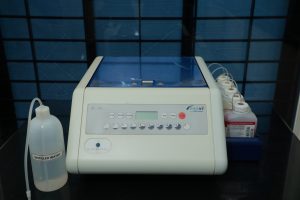 Previcolor gram
Previcolor gram
Rapid method for differentiating between gram-positive and gram-negative bacteria
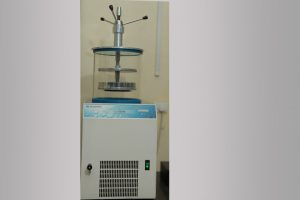 Lyophilizer
Lyophilizer
Machine that can be used to freeze-dry microorganisms, making them easier to store and transport.
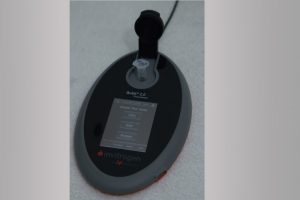 Fluorometer
Fluorometer
Instrument that uses fluorescent dyes to determine the concentration of either nucleic acids or proteins in a sample.
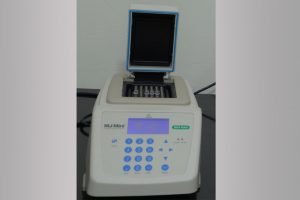 Thermal cycler for PCR
Thermal cycler for PCR
Machine that can be used to amplify DNA, a process that is often used in molecular biology research.
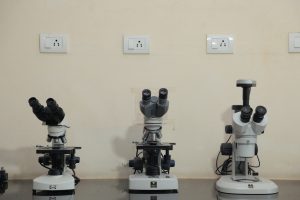 Different types of microscopes
Different types of microscopes
Including light microscopes and confocal microscopes.
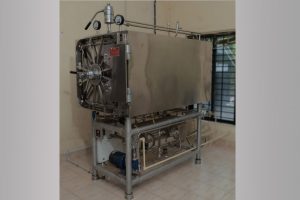 Horizontal rectangular Autoclave
Horizontal rectangular Autoclave
Machine that can be used to sterilize equipment and materials.
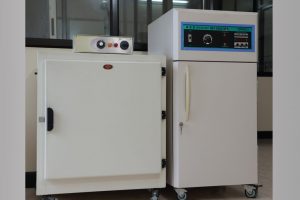 BOD Incubator
BOD Incubator
Machine that can be used to incubate samples at a specific temperature and oxygen level.
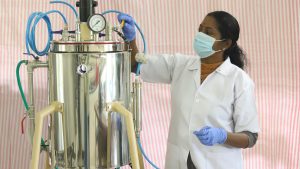 Bio-fermenter
Bio-fermenter
a machine that can be used to grow microorganisms in controlled conditions.
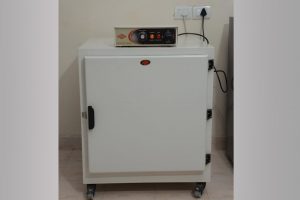 Hot air Oven
Hot air Oven
Machine that can be used to heat samples to a specific temperature.
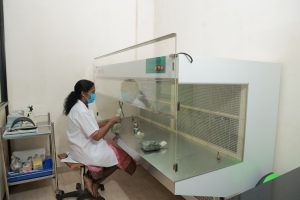 Laminar Air flow chamber
Laminar Air flow chamber
Clean room environment that is used to prevent contamination of samples.
NCRMI's Microbiology Lab is also a home to various general analytical instruments, ensuring comprehensive research capabilities. These instruments support the analysis of microbial samples, monitoring of biochemical parameters, and characterization of microbial communities.
Hands on training course on microbiological identification – biochemical, genotypic and mass spectrometric methods
NCRMI offers a 10-days program titled Hands-on Training Course on Microbiological Identification - Biochemical, Genotypic, and Mass Spectrometric Methods to scholars, professionals, and teachers in the life sciences, focusing on equipping participants with skills to identify microorganisms using advanced automated microbiological equipment and providing insights into modern rapid methods in microbiology, including topics such as microbial taxonomy and hands-on training in bacterial identification.
Hands on training for the mass production of bio control agent Trichoderma from the mother culture
NCRMI is offering a one-day training program for farmers and officials, with a focus on imparting practical knowledge of microbiological sterilization procedures for cultivating the biocontrol agent Trichoderma from the mother culture. The training also covers precautionary measures during the mass cultivation of Trichoderma.
Technology dissemination & Training of coir pith composting to the workers of defibering
The project aims to provide sustainable coir pith compost training to workers in DF units and the coir industry, fostering their expertise in the environmentally friendly conversion of coir pith for plant cultivation. The training focuses on sustainable practices to promote the responsible use of coir resources in agriculture. units
Industrial visit for the Microbiology graduate and post graduate students of colleges
NCRMI provides an industrial visit opportunity for graduate and postgraduate students majoring in Microbiology.
Training on Coir Pith Compost
NCRMI organized coir pith compost training for diverse DF units including Coir Corporation, Coir Fed, CVCS throughout Kerala, as well as Private entrepreneurs and KCCPL
Spawn Production Unit
NCRMI features a dedicated, fully-fledged spawn production unit, ensuring the efficient generation of inoculum for coir pith composting.
Inoculated Pith Production Unit
NCRMI boasts a state-of-the-art inoculum unit designed specifically for the production of pith activator. The unit focuses on generating high-quality inoculum to facilitate the composting of household organic wastes efficiently.
Training on House Hold Waste Composting
NCRMI organized training sessions on household waste composting for diverse public and private areas.
Microbiological analysis of Coir and Coir related Products.
Within its laboratory setup, NCRMI is dedicated to the meticulous microbiological analysis of coir and coir-related products. This specialized facility is equipped with advanced tools and methodologies, allowing for in-depth examinations of microbial communities in various coir materials.
Supply of Mother Culture to various Krishi bhavans.
NCRMI offers availability for the mass production and supply of Trichoderma mother culture to various Krishi Bhavans.
- Sri Abhishek C, Scientist S3
- Smt Soumya T. V, Technical Officer (Microbiology)

